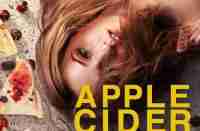Let’s talk about…
Media “based on a true story”
Each episode of Netflix’s ‘Apple Cider Vinegar’ begins with the same disclaimer: “This is a true story based on a lie. Some names have been changed to protect the innocent. Belle Gibson has not been paid for the recreation of her story.”
The series, which has enjoyed alternate rankings on the platform’s Top 10 list over the past few weeks, follows the aforementioned Belle Gibson – who amassed millions of Instagram followers in the early 2010s with her inspirational account of how she’d beaten a terminal brain cancer diagnosis with healthy diet. Gibson went on to kickstart a hugely successful career off the back of this following, launching a recipe app called ‘The Whole Pantry’ (which saw her enter talks with Apple to make the app a privileged pre-installed default third-party inclusion in the Apple Watch) and signing a book deal with Penguin. All the while, Gibson continued to post content promoting the efficacy of her healthy eating methods in battling cancer, also sharing that much of her profits – then reportedly in excess of A$1million – was going to various charities, cancer-related and otherwise.
Then, in March 2015, investigative journalists who had noticed inconsistencies in Gibson’s cancer narrative and began researching the influencer, revealed there was no evidence of her purported donations. Under mounting pressure and public scrutiny, Gibson admitted in April 2015 that she had entirely fabricated both her cancer diagnosis and charitable contributions. She was fined A$410,000 for misleading consumers in 2017 – a penalty she has yet to pay as of 2025.
While the revelation shocked people around the world – particularly in Gibson’s native Australia – undoubtably, the most insidious consequence of this years-long con was the impact it had for those of her followers who did actually have cancer, who had been encouraged to shirk conventional medicine in favour of Gibson’s alternative ‘treatments’.
Now, a decade on from when this scandal first broke, comes Netflix’s ‘Apple Cider Vinegar’. And in many ways, given the shocking nature of Gibson’s story, it is unsurprising to see the platform release a series based on it. After all, the “based on a true story” category of media has become a very reliable genre in modern entertainment in recent years.
These “based on a true story” narratives add an additional point of interest to a piece of media, tapping into the very human fascination with real-life deception, scandal, and intrigue that causes the true stories they’re based on to gain such exposure in the first place. In fact, ‘Apple Cider Vinegar’ appears to form part of a growing sub-genre within this niche itself – the rise and fall of real-life high-profile con-women, with Hulu’s ‘The Dropout’ (based on infamous Theranos founder Elizabeth Holmes) and Netflix’s ‘Inventing Anna’ (based on faux socialite Anna Sorokin) having enjoyed their own respective successes in recent years.
However, media “based on a true story” can be murky business; with each new adaptation comes the familiar ethical dilemmas. When does the dramatization of a true story become exploitative rather than informative? How much fictionalisation is too much? And perhaps most importantly – who gets to benefit from telling these stories?
For its part, ‘Apple Cider Vinegar’ is quick to tack the line “Belle Gibson has not been paid for the recreation of her story” onto the end of its repeated disclaimer. Creator and writer Samantha Strauss has expressed she thought this an essential inclusion, after a friend, upon hearing she was doing the show, asked: “Why would you want to give this woman any more oxygen? Are they being paid for it?”
It goes without saying that any version of ‘Apple Cider Vinegar’ that did reimburse Gibson would’ve been met with unquellable outrage (and rightly so). And given that the latest reports on Gibson have her claiming to be “adopted” into Melbourne’s Ethiopian community, calling herself Sabontu, and speaking in broken English, she looks unlikely to try and profit off the show in other ways; to use it to re-ignite some sort of public attention or favour – as, for example, faux socialite Anna Sorokin has (in spite of her ongoing house arrest), appearing in interviews and on television, and building a substantial following since Netflix’s portrayal of her attempts to infiltrate New York’s elite social circles under false pretences in ‘Inventing Anna’ (due in no small part to Gen Z’s semi-ironic conclusion that her actions were more ‘iconic’ than insidious).
In this respect, ‘Apple Cider Vinegar’ appears to have steered clear of a major problem similar shows have fallen into – that is, benefiting the figure they’re meant to be criticising. And in the absence of Gibson being able to profit (metaphorically or monetarily) from ‘Apple Cider Vinegar’ comes the opportunity for the show’s impact to be more about its message than its inspiration, which is perhaps more aligned with what we should expect from media “based on a true story”.
After all, there is a distinction between a documentary and a show like this; a documentary should be about the facts, but when something is “based on a true story”, there’s an inherent understanding that some aspects have been dramatized and/or completely fictionalised.
This understanding is made explicit in ‘Apple Cider Vinegar’s disclaimer: “Some names have been changed to protect the innocent”. Though of course, the show also takes creative liberties for less magnanimous reasons – that is, for the sake of a better/more cohesive narrative, with another disclaimer for the series to be found in its advertisement as a “true-ish story”.
The show gets a bit tongue-in-cheek with this description; ‘Apple Cider Vinegar’ is a true-ish story in that aspects of the Belle Gibson scandal have been made up for the show, but also in that it is “a true story based on a lie”; Gibson’s lie. The irony is not lost on Strauss, who noted, “It’s an interesting thing when you’re dealing with someone who has lied and you’re creating a work that is, in some respects, fiction as well.”
This acknowledgement is important, not just for the sake of full disclosure, but also legally for Netflix – something they’ve been made particularly aware of in recent months with the aftermath of another of their real-life inspired shows, ‘Baby Reindeer’.
‘Baby Reindeer’ saw Scottish comedian Richard Gadd star in a retelling of his experience with a female stalker, and how it forced him to relive the past sexual trauma he had buried. The show became explosively popular for its effectiveness as a ‘comedy-thriller’, its cinematographic choices, and its enormous emotional impact, but amid the hype that greeted the show’s release, curiosity grew over the real identity of ‘Martha’ – the name given to Gadd’s stalker in the show. And because Netflix had changed very little in its depiction of this woman beyond her name, this growing curiosity eventually culminated in internet ‘sleuths’ exposing her actual identity.
The woman went on to appear on a now infamous episode of Piers Morgan Uncensored, in which she denied much of what the show had depicted. And in September, she given the green light to proceed with a US$170m defamation lawsuit against Netflix after a judge ruled the series was wrongly billed as “a true story”, not “based on a true story”. As a result, for many ,the name ‘Baby Reindeer’ conjures up memories of this chaotic aftermath, as opposed to the messages the show attempted to put across regarding trauma, obsession, male victims of assault, and the long-term effects of abuse.
There is not just an appetite for media “based on a true story”, but a real place for it culturally, in terms of how it can reflect and comment meaningfully on societal issues. Similar to ‘Baby Reindeer’ being about more than Gadd, ‘Martha’, or anyone else, ‘Apple Cider Vinegar’ is not just about Gibson; it explores the unchecked and pervasive influence of social media, the allure and false promises of modern “wellness” culture, and most devastatingly, the true toll of a cancer diagnosis, and how those who feel unheard or let down by conventional medicine end up scrambling for alternative options.
Ultimately, the challenge with ‘true-ish’ storytelling lies in striking the right balance—between authenticity and entertainment, between creative license and ethical responsibility. When done well, these stories can illuminate cultural issues, spark conversations, and even offer some form of validation for those who’ve experienced hardships. But when handled more carelessly, they risk becoming exploitative or misleading, or, for the creators behind them, legally problematic – something Netflix has quickly learned the ‘truth’ of.






